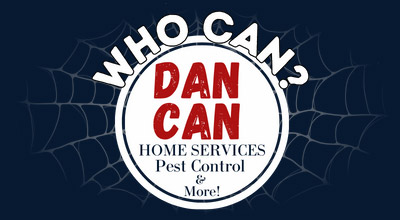Dan Can Home Services is your source for expert pest control and home services in Ocean County, Burlington County, Mercer County, and beyond. Stinging insects like yellow jackets, hornets, bees, and wasps can pose significant risks to homeowners and their families. We understand these insects, their behavior, and the importance of safe and effective control. We’re here to help you protect your home, your family, and the environment.
Types of Stinging Insects in New Jersey
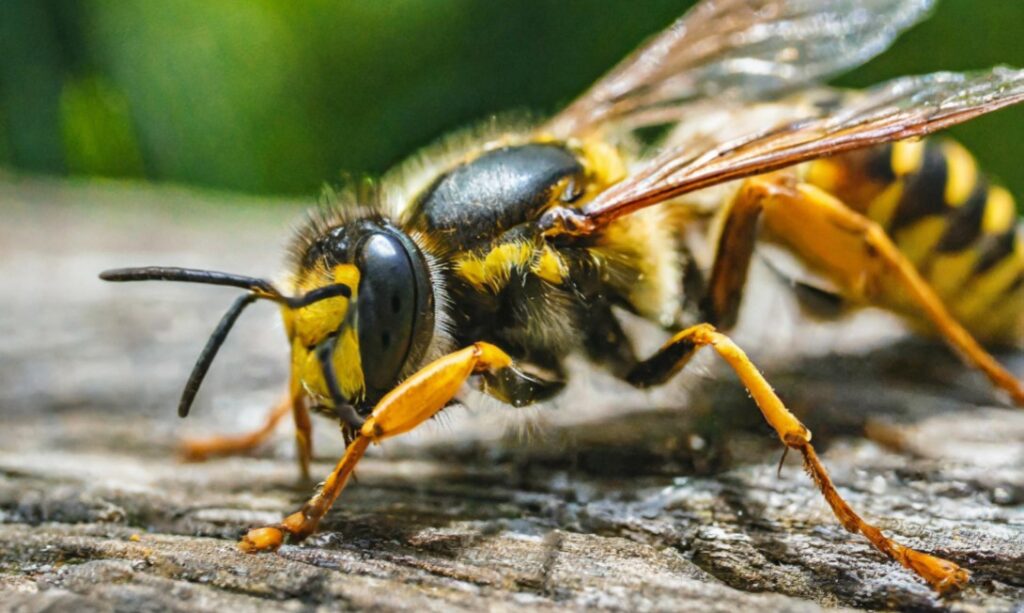
Yellow Jackets
Identification: Yellow jackets are black with yellow markings and are about 10-16 mm long. They build nests in underground burrows, wall voids, and attics.
Behavior: Aggressive when threatened, yellow jackets can sting repeatedly and are attracted to food and sugary drinks.
Health Risks: Their stings can cause allergic reactions in some individuals, ranging from mild irritation to severe anaphylaxis. When disturbed they will attack in large numbers. Recommend sealing up holes around the home and filling any holes in the ground around your home to reduce the chance of them nesting near you.
Fun Fact: Yellow Jackets have their purpose and will help to reduce other insects around their nest. However, of all the stinging insects that we deal with, these we mostly always suit up for as they are so aggressive and will sting even if unprovoked.
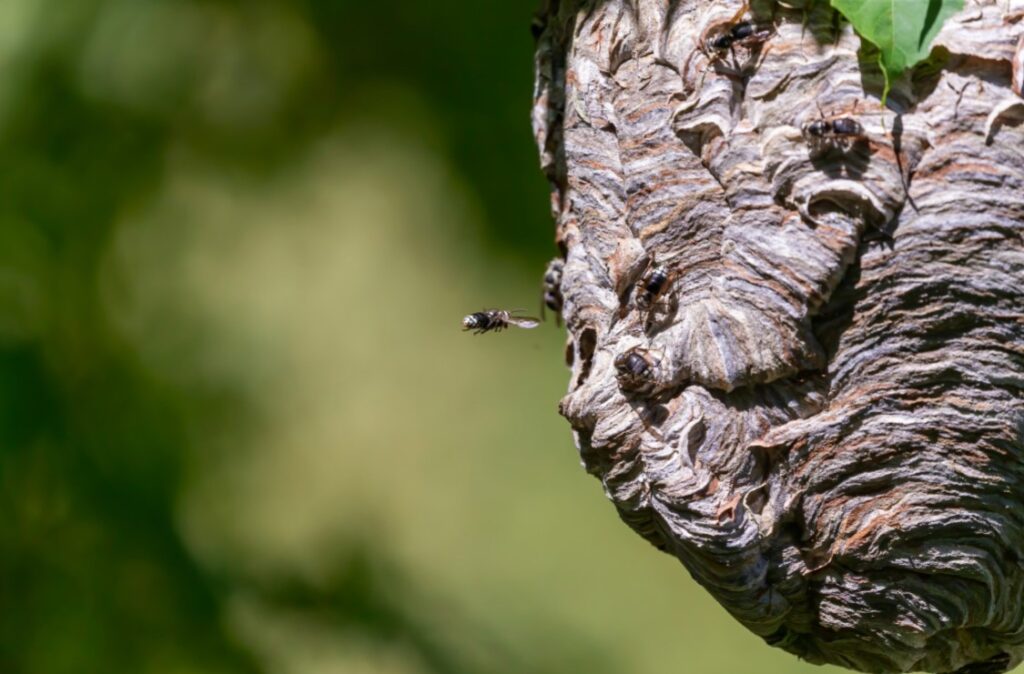
Bald-Faced Hornets
Identification: Bald-faced hornets are black with white markings and are larger than yellow jackets, about 16-20 mm long. They build large, paper-like nests in trees and shrubs.
Behavior: Highly defensive of their nests, bald-faced hornets can sting repeatedly and will attack perceived threats.
Health Risks: Their stings are painful and can cause allergic reactions in sensitive individuals.
Fun Fact: These are not actually hornets at all and are actually, wasps. In fact, bald-faced hornets are closely related to the Yellow Jacket Wasp.
European Hornets
Identification: European hornets are larger than yellow jackets, about 25-35 mm long, with yellow and brown markings. They build nests in hollow trees, wall voids, and attics.
Behavior: They are less aggressive than other hornet species but will defend their nests if threatened.
Health Risks: Their stings are painful and can cause allergic reactions similar to other stinging insects.
Fun Fact: These hornets are the only true hornets that we have throughout North America. Let’s be grateful as in parts of Asia there are as many as 20 different Hornet species.
Digger Bees
Identification: Digger bees are solitary bees that resemble honey bees but are smaller and have distinctive nesting behaviors in the ground.
Behavior: They are not aggressive and rarely sting unless provoked. Digger bees are beneficial pollinators.
Health Risks: Their stings are mild and pose minimal risk to humans.
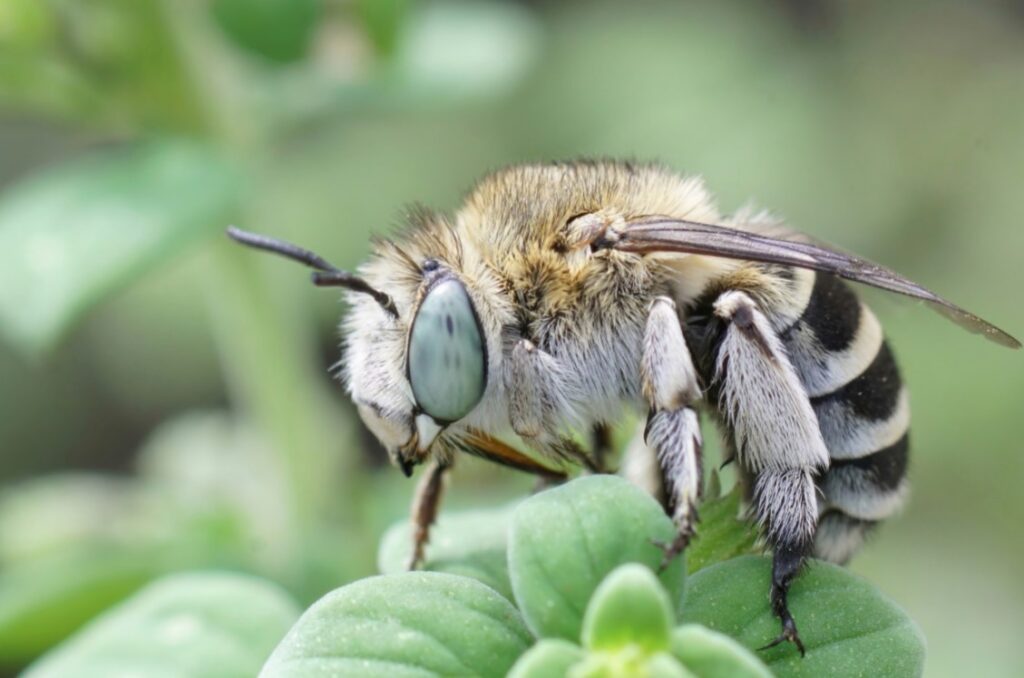
Fun Fact: Diggers bees will make ground nests and can quickly overpopulate an area. They are great pollinators and will help your flowers grow. If you are uneasy about them the best thing to do is set up a sprinkler in the area where they nest. This will push them out and make them want to move to another location.

Honey Bees
Identification: Honey bees are about 12-15 mm long with varying colors of yellow, brown, and black. They build wax comb nests in trees, attics, and wall voids.
Behavior: Honey bees are docile and only sting when defending their colony. They are crucial pollinators for agriculture and ecosystem health.
Health Risks: Their stings can cause allergic reactions in some individuals, but they are less aggressive than wasps and hornets.
Fun Fact: Honeybee’s are crucial to our ecosystem. No Bees= No Food! Many people will self-treat thinking these are wasps and will spray their flowering plants. This should NEVER BE DONE. Miss treating with an application can cause a symptom known as Hive Collapse. Where if one Honeybee lands on certain applications and get back to their hive that active ingredient can kill off the entire colony which is no good for anyone. Know what you are doing before you spray or call a professional.
Carpenter Bees
Identification: Carpenter bees resemble bumble bees but have a shiny abdomen. They bore into wood to create nesting galleries.
Behavior: Male carpenter bees are aggressive but cannot sting. Females can sting but are not typically aggressive toward humans.
Health Risks: Their stings are painful but do not pose significant health risks unless allergic.
Fun Fact: Carpenter Bees can cause a lot of damage to your decks, facia boars, pergolas, awnings or any exposed dry wood. The queen will drill a small hole and burrow out gallies to lay her larva. These galleries can be several feet long. What’s worst is that birds of prey like Woodpeckers can go after the larva as a food source and then cause even more damage to your home.
Bumble Bees
Identification: Bumble bees are robust and furry, with black and yellow markings. They nest in soil, leaf litter, or other protected areas.
Behavior: Bumble bees are social and can sting multiple times if threatened. They are important pollinators.
Health Risks: Their stings are painful but typically only pose health risks to those allergic to bee venom.
Fun Fact: Easiest way to tell Bumble Bees and Carpenter Bees apart, look at their abdomen! If it is covered in fur, it is a Bumble Bee. If it is bald and shiny it is a Carpenter Bee. Bumble Bees and other great pollinators are covered in fur to collect pollen and spread to other flowers.
Cicada Killers
Identification: Cicada killers are large wasps, about 25-40 mm long, with black and yellow markings. They dig burrows in sandy soil.
Behavior: They are solitary but can be aggressive when defending their burrows. Despite their size, they are not generally aggressive toward humans.
Health Risks: Their stings are painful but rarely encountered by humans unless provoked.
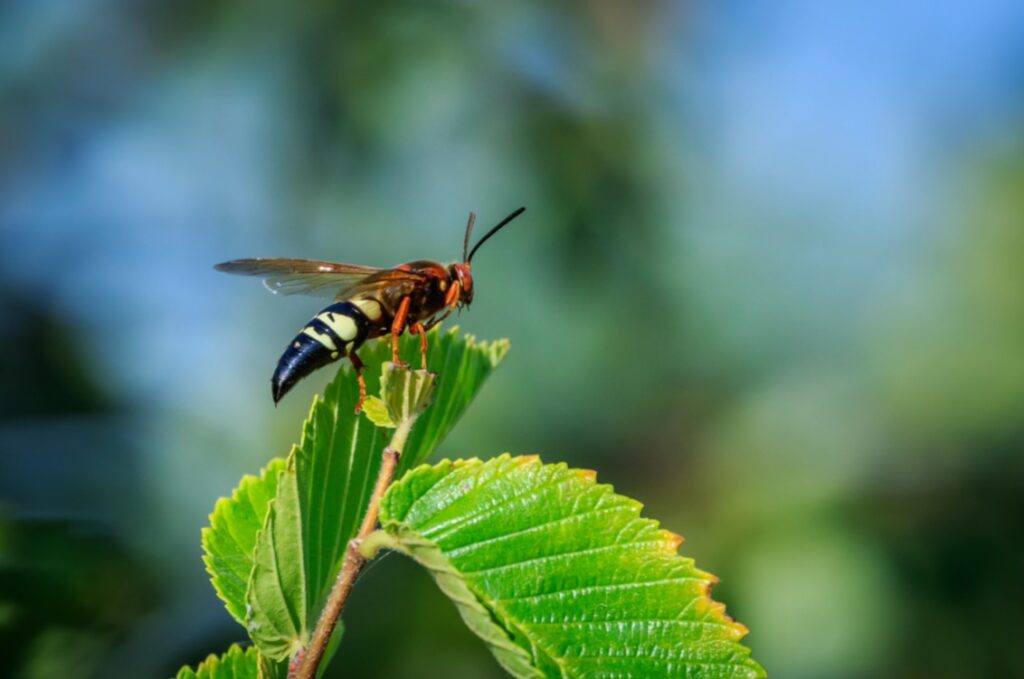
Fun Fact: Cicada Killers will sting Cicadas and drag them down into their ground burrows to be fed to the queen’s larva. The Cicada remains paralyzed and kept alive for as long as possible to be a food source over a year to allow next years wasps to emerge from the burrow.
Paper Wasps
Identification: Paper wasps are slender with long legs, about 15-20 mm long, and have brown or reddish bodies with yellow markings.
Behavior: They build open, umbrella-shaped nests under eaves, in attics, and on tree branches.
Health Risks: Paper wasps can sting multiple times and are protective of their nests, posing risks to those allergic to stings.
Fun Fact: Paper Wasps will use their mandibles to scrap small bits of bark, wood and even paper to mix with their saliva to create their nests. In test environments these wasps have even been given different colored construction paper and have made their nests multi-colored with the paper.
Mud Dauber Wasps
Identification: Mud daubers are slender with a narrow waist, about 15-25 mm long, and are typically black or metallic blue with yellow markings.
Behavior: They build mud nests in sheltered locations like under eaves, bridges, and attics.
Health Risks: Mud daubers are not aggressive but can sting if threatened, posing mild health risks.
Fun Fact: Mud Daubers or Mud Wasps love spiders! They will sting spiders and put them inside their mud tubes for the larva to feed on. Their mud tubs can be unsightly on your home but can be easily removed with power washing. After a treatment of course to ensure it is safe to do so.
Risks of Stinging Insect Infestations
Stinging insect infestations pose significant risks, both to health and property. These insects can deliver painful stings, and for sensitive individuals, these stings can trigger allergic reactions that may escalate into severe medical emergencies. It’s important to note that even if you’re not currently allergic, allergies can develop at any point in life. Beyond health concerns, certain stinging insects, such as carpenter bees, can cause property damage by boring into wood to create nests, potentially compromising the structural integrity of your home.
Importance of Professional Pest Control
Expertise plays a vital role, as correctly identifying and understanding stinging insects is essential for implementing effective and safe control measures. Additionally, professional pest control technicians possess the knowledge and specialized tools needed to safely remove nests and treat infestations, ensuring homeowners are not put at risk. Moreover, proper pest control practices are crucial for environmental protection; professionals are trained to use pesticides responsibly, minimizing the risk of harming beneficial insects like honeybees, which are vital for pollination and agriculture.
How Dan Can Home Services Can Help
At Dan Can Home Services, we specialize in stinging insect control solutions designed to protect your home and family. We begin with a thorough identification and assessment to accurately determine the species and location of stinging insect nests on your property.
Once identified, we safely remove the nests and apply targeted treatments to eliminate the insects without harming beneficial species. To prevent future infestations, we offer recommendations for reducing attractants around your home. Additionally, we educate homeowners on safe practices and emphasize the importance of professional pest control for managing stinging insects.
Why Choose Dan Can Home Services?
Choosing Dan Can Home Services means benefiting from expert knowledge and experience. “Dan the Bug Man” and his team are highly skilled in handling stinging insect infestations with care and precision. Safety is our top priority, and we ensure that our pest control practices protect your family, pets, and the environment.
As a locally-based service, we understand the unique pest challenges in Ocean County, Burlington County, Mercer County, and the surrounding areas. Our mission is to provide effective pest control solutions that give you peace of mind, allowing you to enjoy your home without the threat of stinging insects.
Importance of Reading Labels and Professional Help
Reading Labels
Always read and follow pesticide labels carefully before attempting to treat stinging insects yourself. Using the wrong product or misapplying treatments can exacerbate the problem and harm beneficial insects like honey bees.
Professional Help
For safe and effective control of stinging insects, especially in sensitive areas or near honey bee colonies, it’s best to rely on professional pest control services. Dan Can Home Services can provide expert guidance and treatments tailored to your specific pest control needs.
Call 609-224-8071 or Contact Us for stinging insect pest control in New Jersey
Frequently Asked Questions about Stinging Insects in New Jersey
Q: What should I do if I find a stinging insect nest near my home?
A: It’s best to avoid disturbing the nest and contact a professional pest control service like Dan Can Home Services. Our trained technicians can safely and effectively remove or relocate the nest.
Q: Are all bees and wasps aggressive?
A: Not all bees and wasps are aggressive. Honeybees and bumble bees are generally non-aggressive and only sting when threatened. However, yellow jackets, bald-faced hornets, and some types of wasps can be more aggressive, especially when their nests are disturbed.
Q: Can stinging insects cause structural damage to my home?
A: Carpenter bees can cause structural damage by drilling holes into wood to create nests. Other stinging insects like yellow jackets, hornets, and paper wasps do not typically cause structural damage, but their nests can be a nuisance and a safety hazard.
Q: How can I prevent stinging insects from nesting on my property?
A: Regular maintenance and inspections can help prevent stinging insects from nesting on your property. Sealing cracks and gaps, keeping food sources covered, and removing potential nesting sites like old wood and debris can reduce the likelihood of an infestation.
Q: Can you help with honey bee removal without harming the colony?
A: Yes, at Dan Can Home Services, we prioritize the safe removal and relocation of honeybee colonies to protect these vital pollinators. We work with local beekeepers to ensure the bees are safely transported to a new location.
Q: What should I do if I get stung by a bee or wasp?
A: If you get stung, clean the area with soap and water, apply ice to reduce swelling, and take an antihistamine to relieve itching. Seek medical attention if you experience severe reactions, such as difficulty breathing, swelling of the face or throat, or dizziness.
Q: Do you offer guarantees for your stinging insect control services?
A: Yes, we offer warranties for our one-time services and routine plans that provide continuous protection and peace of mind. Our goal is to ensure your home remains free from stinging insect infestations.
Q: How quickly can you address a stinging insect issue?
A: We provide prompt service and can often schedule an appointment within 24-48 hours to address your stinging insect concerns effectively.
Q: What are the risks of using aerosol treatments for stinging insects?
A: Using aerosol treatments can pose several risks, including making the problem worse by scattering the insects, potentially harming your home, and endangering beneficial insect populations. Professional treatment ensures safe and effective control.
Contact Dan Can Home Services today to schedule your consultation and discover how we can protect your home from stinging insects. Remember, at Dan Can Home Services, we can because we care!
